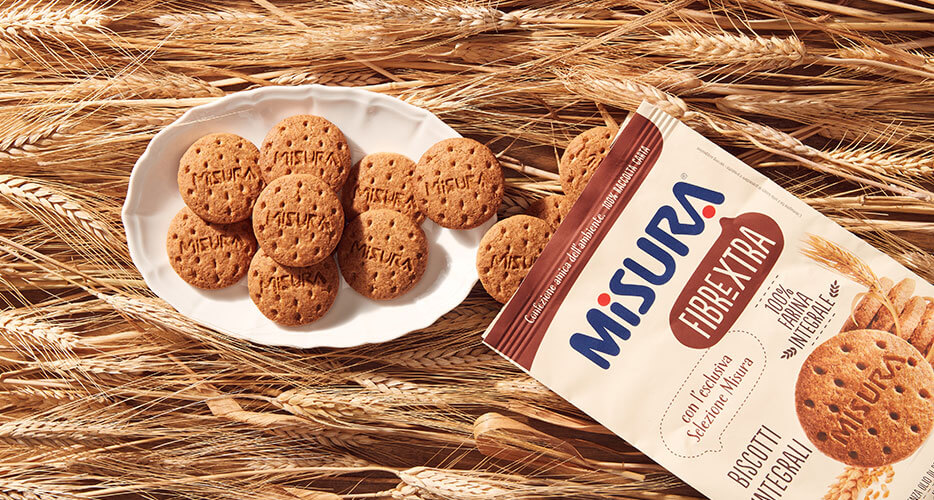
We know that good health also comes from the intestine: this important apparatus is able to modulate our sense of well-being and good intestinal function also depends on proper nutrition.
Misura's interview with Dr. Andrea Del Seppia
Let's talk about the topic with our nutritionist, Dr. Andrea Del Seppia.
Dr. Del Seppia, the importance of dietary fiber in guaranteeing intestinal well-being is known, but is the fiber all the same?
There are two different types of dietary fiber: soluble and insoluble. Plant foods often contain both in different proportions. Insoluble fiber has the property of absorbing water and in this way it increases the volume and softness of the fecal mass, favoring its transit along the intestine: it is thus able to stimulate peristalsis. Therefore, a diet poor in whole grains and vegetables can lead to slowed intestinal transit. The second type of fiber, called soluble or gelling, has other effects on intestinal well-being: these substances are indigestible by our enzymes but they represent an important source of nourishment for the good bacteria that populate the intestine. Soluble fiber, therefore, has a remarkable prebiotic effect - that is, it favors the balance of a healthy bacterial flora - and also guarantees the maintenance of a correct pH (or acidity level) of the intestinal environment, protecting us from dangerous microorganisms
What are the dietary precautions that it is desirable to adopt in order to enjoy a good intestinal transit?
The cornerstones for achieving good bowel regularity are two: adequate fiber intake (25 grams per day, with daily consumption of plant foods) and water, about 2 liters for women and 2 liters and a half for men (LARN , IV Review, SINU 2014). The same fruits and vegetables recommended for the fiber content also contain a good percentage of water, which is important for softening the faeces. A correct water supply (mainly from water or unsweetened teas) is essential to ensure that the insoluble fiber is able to hydrate properly, otherwise it would end up exerting a constipating effect instead of accelerating peristalsis. It is good to remember to maintain an adequate and constant daily water supply starting from the awakening when the water demands are greater. However, sometimes these measures may be insufficient: there are cases in which, even with the intake of liquids and fiber in line with the recommendations, intestinal regularity is still not optimal. Excluding pathological changes, in these situations other food variables must be kept in mind. For example, the excessive reduction in the feeding of fats from extra virgin olive oil risks reducing the lubricating and softening function of the precious monounsaturated lipids contained in the Mediterranean condiment par excellence. The role of some food sources of carbohydrates is also of fundamental importance: their rehydration, as happens in the cooking of pasta, increases their volume and water content. Low-calorie diets, which greatly reduce this important macronutrient from feeding, risk causing a slowed-down intestinal transit.
Are there other factors involved in maintaining the well-being of our intestines?
The set of microorganisms that inhabits our gastrointestinal tract is called microbiota and, if in balance, it helps to maintain good intestinal function and motility, protects us from certain infections, supports the digestive processes and produces some vitamins. The intestinal bacterial flora has a fundamental role in preserving the state of general health and needs to be fed with the prebiotic substances mentioned above. These microorganisms have shown to be able to regulate many extra-intestinal functions, in particular some aspects of the immune system. The most recent research is investigating their potential in modulating some responses in the brain thanks to the so-called gut-brain axis. The state of equilibrium at the level of the microbiota is called "eubiosis" and foresees that the probiotic microorganisms (ie that component which has a positive action for our body) are well represented, in order to keep the other components of the microbial flora at bay.
In our lifestyle and in our daily diet, however, there are numerous substances that can impoverish the intestinal bacterial flora (in particular some drugs, preservatives and additives) and that make us tend to an imbalance at the level of the microbiota, known as " dysbiosis ", which affects our intestinal and non-intestinal health.

Are there functional foods that can help intestinal health?
Many populations around the world have a long tradition of fermented foods.
The fermentation process changes the nutritional and organoleptic characteristics of the starting food, allowing it to be prolonged. Speaking of fermented foods, in our culture we immediately think of yogurt: although the milk enzymes contained in this food cannot survive long in our intestines, yogurt seems to have positive effects on our health (especially if there is no an abundant addition of sugars). Several fermented foods typical of other geographical areas such as kefir (a fermented milk typical of the Caucasus region), kombucha (a sweetened and fermented drink made from tea leaves) and fermented vegetables are good allies of intestinal well-being.
The intake of fermented foods, thanks to the combination of the components they contain, exerts a beneficial action and seems to help protect us from dangerous micro-organisms and guarantee balance and microbial diversity in the intestine.
What changes in your lifestyle can help intestinal health?
The role of physical activity should not be underestimated: sedentariness should be avoided (and not only for the problems of constipation!), In this case preferring aerobic activities that promote intestinal motility more: for the laziest, the walks, as long as daily. Finally, do not overdo irritating substances such as coffee or alcohol and maintain a regular rhythm of the five daily meals.
Read the full article on Misura® website
Link to Dr. Andrea Del Seppia page on the official Misura® website
Misura® is a registered trademark of Colussi S.p.A. The material reported in this article is the property of Colussi, who authorized its publication.